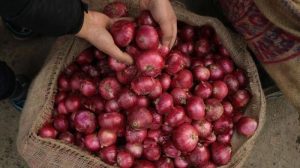
India’s ‘Onion Diplomacy’ in Bangladesh and UAE:
India has had a ban on onion exports for quite some time now. But onions are being sent to some countries like Bangladesh, United Arab Emirates, Bhutan within this ban.
At present, despite the increase in the global price of onions, Indian farmers and traders are angry about the export of onion from India to those countries at a low price.
Exporters complain that Indian farmers are paid Tk 12 to Tk 15 per kg of onion but when the same onion reaches the UAE it fetches Tk 120 per kg.
Now the question is why the Indian government is selling onions to selected countries despite the export ban? Has onion export become a part of diplomacy for India?
But experts say, this practice is not completely new. India has also exported food products, essential goods and services to its neighboring countries at various times before.
Onion and its price is a very sensitive issue in India from a political point of view. Onion price has become an important election issue at various times.
Perhaps the most direct impact of onions on Indian elections was seen in 1998. It is believed that the high price of onion was responsible for the BJP’s defeat in the Delhi assembly elections that year.
Again, the good of the neighboring country is also beneficial for the neighboring country. That is why friendly exchanges continue, experts said.
Incidentally, the Indian government stopped the export of onions from December due to fear of shortage. Last month the government extended the ban till further orders.
But the Government of India is accepting through political channels that there is a demand for onions.
Meanwhile, farmers have been opposing the ban on onion exports ever since. Farmers also protested in Maharashtra after the announcement by the government. Angry farmers also staged demonstrations at Lasalgaon, Nandgaon, Pipalgaon and Umrane in Nashik. Incidentally, these regions are major centers of onion production.
Economics and trade expert Pratim Ranjan Bose told the BBC that onions becoming part of diplomacy is not new.
“Onion is a politically sensitive issue in terms of inflation. It is not new that the government of one country sends onions to the government of another country, which is seen as part of diplomacy. It has happened earlier in wheat, sugar and it will increase in the coming days,” he said.
Mr. Explaining the matter, Basu says that some countries have become the world’s largest suppliers in terms of production of food products and various goods. Many other countries depend on them. A producing country can stop exports at will, although no one will officially admit it.
“For example, China occasionally imposes restrictions on the export of semiconductors, active pharmaceutical ingredients. China can do it if it feels like it because the whole world depends on them for some of these things,” said Pratim Ranjan Bose.
At the same time, according to him, “There will be politics about food. It cannot be avoided.” Because food products have a different importance from a political point of view.
However, it is not a new ‘custom’ for friendly countries to make exceptions to the rules. In this case, there will be issues like quid pro quo or in simple Bengali, ‘favor instead of grace’.
Mr. Basu said, “A country may feel that a friendly country needs them. They can send something to that friendly country. There will also be a quid pro quo as to why it will be sent.”
“India’s ‘Onion Diplomacy’ in Bangladesh and UAE”Stay tuned to know more about this latest hot news.